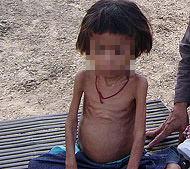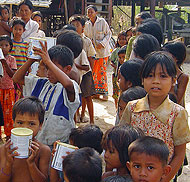In Cambodia, medical corruption punishes the poorest of the poor
Published on 4 April 2006LICADHO dispatched a team from its Medical Office to provide emergency assistance to the small village of Phluk Thnung, in Kampong Speu province, after Radio Free Asia reported the village was suffering from a sudden increase in health and nutrition problems. They were joined by both national and international organization and provided health care services, medicine, dry food and vegetables to villagers in need.
The medical team first visited Phluk Thnung on March 5, 2006. Carrying with them basic medicine and vitamins, the field visit revealed a village plagued by poverty and insufficient basic infrastructure. Several villagers were found to be gravely ill or disabled, and lacked the resources to seek treatment.
The villagers said corruption at government health stations was the primary barrier to seeking medical assistance for problems including malnutrition, parasitic diseases such as malaria, disease from dirty water and lack of hygiene, as well as temporary and permanent physical disability due to lack of medical care after an injury. One man had suffered from an untreated broken leg for four years before receiving medical attention. Shortly after LICADHO's visit, when he received proper medical care, the man regained mobility and is recovering well.

One of the children treated by LICADHO's medical teamA villager from Kong Pisey district, where the village is located, told LICADHO medical staff that the provincial public health center required him to pay for services with cattle before receiving treatment. Unfortunately for most rural Cambodian's, relinquishing even the most meager of possessions can have a huge impact on their ability to support themselves and their families.
This endemic corruption can be observed in most public services. Due to inadequate and irregular salaries, some doctors will compensate themselves with bribes in the form of livestock, money and other valuable items. These are extorted from clients before services are provided. Yet, according to the mandate of the Ministry of Health, medical care for poor Cambodians should be free of charge.
Another factor degrading health standards in Kampong Speu, is the fact that the five villages that make up the Kong Pisey district share just one well. This means approximately 1,000 families are dependent on a single water source, often far from their homes. The scarcity of water compounds health, hygiene and safety problems for villagers. Kampong Speu is a relatively economically stable province, with the means for local government to provide for its people, and yet a lack of infrastructure persists.
LICADHO's medical team revisited patients for follow up treatment on March 12 and March 25, and noted general improvements in the health of the villagers.
While both Cambodian and international organizations have provided emergency assistance to the best of their abilities, it is inevitably non-sustainable. LICADHO urges the Ministry of Health to comply with its mandate at all levels and take appropriate disciplinary actions to end systematic corrupt practices. Furthermore, it is the responsibility of provincial governors to ensure the fruits of investment and development are distributed to small villages as well as larger cities and towns.








